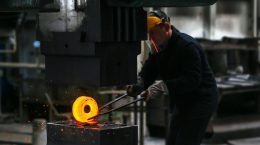“Belaruskali” is the real pride of many fans of the illegitimate government: high salaries, jobs for the whole city, infrastructure development. However, it was the workers of this enterprise that went on strike almost immediately after the elections and protested most actively against the Lukashenko regime, and even now they continue to do so, despite numerous repressions. Today we will tell you about the hero miners who have been fighting for the freedom of Belarus for almost eight months.
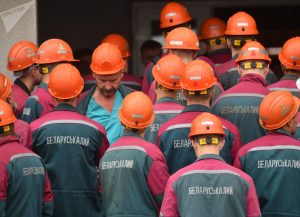 The strike at “Belaruskali” first became known on 17 August. Before that, an appeal of the workers of the enterprise appeared in the Soligorsk social networking group VKontakte: “We cannot stand aside from the ongoing lawlessness, obscurantism and terror against the civilian population. It is inconceivable that our long-suffering country was turned into a concentration camp, where innocent citizens and their children are thrown into prisons and brutally tortured. We do not want to feed the punishers who beat us for our own taxes”. It was planned that the company would stop all mining and tunneling complexes and branches of sylvinite processing plants, and work on the auxiliary workshops would stop.[1]
The strike at “Belaruskali” first became known on 17 August. Before that, an appeal of the workers of the enterprise appeared in the Soligorsk social networking group VKontakte: “We cannot stand aside from the ongoing lawlessness, obscurantism and terror against the civilian population. It is inconceivable that our long-suffering country was turned into a concentration camp, where innocent citizens and their children are thrown into prisons and brutally tortured. We do not want to feed the punishers who beat us for our own taxes”. It was planned that the company would stop all mining and tunneling complexes and branches of sylvinite processing plants, and work on the auxiliary workshops would stop.[1]
The strike lasted two days: on August 17, 120 people did not go to work, on the 18th – already 671. Three of the four mining administrations have stopped. Officials put pressure on the miners from all sides, trying to force them to work, but the strikers received a lot of support from ordinary Belarusians and from media people. On August 20, the general director of “Belaruskali” Ivan Golovaty went to court, and on the same day the information spread through the official channels that the enterprise was working at full capacity. On September 12, the strike at “Belaruskali” was declared illegal.
By this time, some of the strike committee members had been repressed. Dmitry Kudelevich was forced to go abroad, he escaped from the KGB through the window. The co-chairman of the strike committee, Anatoly Bokun, was blocked in a car and handed a summons, and after that he was illegally detained at the police station and sentenced to 15 days of arrest. Two more strike committee members, Alesya and Vladimir Loginov, were also detained. Roman Leonchik was invited to the police station for a conversation. Pyotr Pechkurov, Alexander Novik, Pavel Puchenya, Sergei Cherkasov were arrested as well. However, the miners did not even think to be afraid and give up.
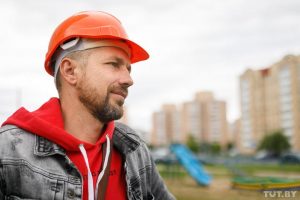 On September 10, Yuri Korzun, a mining excavator driver, went down to the face, handcuffed himself and refused to go up. Prior to that, a post appeared on Yuri’s social networks in which he stated that he could not stand aside when the regime was destroying people. At a depth of 305 meters, he spent about three hours. Then a team of mountain rescuers arrived with tools to cut the chain. While the handcuffs were being removed, Yuri became ill, his heart ached, his blood pressure rose, and he needed urgent medical attention. He was hospitalized.[2] On September 12, it became known about the announcement of an indefinite strike at the enterprise.
On September 10, Yuri Korzun, a mining excavator driver, went down to the face, handcuffed himself and refused to go up. Prior to that, a post appeared on Yuri’s social networks in which he stated that he could not stand aside when the regime was destroying people. At a depth of 305 meters, he spent about three hours. Then a team of mountain rescuers arrived with tools to cut the chain. While the handcuffs were being removed, Yuri became ill, his heart ached, his blood pressure rose, and he needed urgent medical attention. He was hospitalized.[2] On September 12, it became known about the announcement of an indefinite strike at the enterprise.
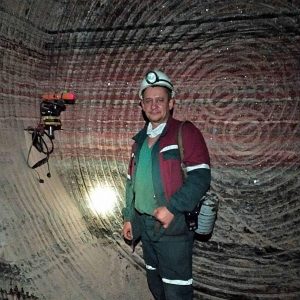 On September 21, in protest, Oleg Kudelka, the foreman of the 4RU mine, refused to rise from the mine. He handed over a note to the surface with the words: “I join the strike and until the demands of the strike committee are met, I refuse to go to the surface.” The miner’s wife Tatiana showed Oleg’s printed appeal. In it, the miner demanded the resignation of the director of “Belaruskali”, the release of all the arrested strike committee members, an end to pressure on them, the cancellation of the dismissals of the strikers and an end to violence. Colleagues who came to support Oleg at the mine (more than 20 people) were detained, and the worker himself was taken out of the mine in an ambulance.[3] And more and more miners began to go to the strike.
On September 21, in protest, Oleg Kudelka, the foreman of the 4RU mine, refused to rise from the mine. He handed over a note to the surface with the words: “I join the strike and until the demands of the strike committee are met, I refuse to go to the surface.” The miner’s wife Tatiana showed Oleg’s printed appeal. In it, the miner demanded the resignation of the director of “Belaruskali”, the release of all the arrested strike committee members, an end to pressure on them, the cancellation of the dismissals of the strikers and an end to violence. Colleagues who came to support Oleg at the mine (more than 20 people) were detained, and the worker himself was taken out of the mine in an ambulance.[3] And more and more miners began to go to the strike.
On September 28, white-red-white flags began to appear at the mines of “Belaruskali”. In early October, when the whole country saw the photo with them, the management of one of the mines began to look for people who hung a flag on the roof of the granulation department. The workers were forced to write explanatory notes on this fact. They have been harassed, including at night, exerting all kinds of pressure and threats.
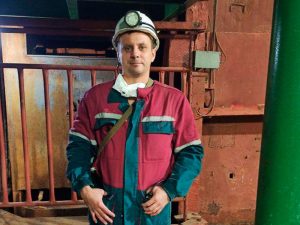 On October 15, another miner refused to return to the surface after his shift. Master-blaster Alexander Kurban chained himself to metal structures. The miner also wrote an open letter addressed to employees of “Belaruskali” and General Director Ivan Golovaty. In the letter, he said that the current political situation in the country has dealt a serious psychological and moral blow to the collective, and the leadership is applying sanctions to those who do not agree with the election results and violence. The miner mentions as well the condition of the equipment at the mines and the violation of safety regulations. An hour after Alexander announced a protest, he was raised to the surface.[4] Literally on the same day, the worker’s access to the enterprise was blocked. And in the evening, the 5th grade pelletizer apparatchik Anton Demkov refused to accept the shift assignment, stating that he did not intend to pay for torture and violence against civilians.
On October 15, another miner refused to return to the surface after his shift. Master-blaster Alexander Kurban chained himself to metal structures. The miner also wrote an open letter addressed to employees of “Belaruskali” and General Director Ivan Golovaty. In the letter, he said that the current political situation in the country has dealt a serious psychological and moral blow to the collective, and the leadership is applying sanctions to those who do not agree with the election results and violence. The miner mentions as well the condition of the equipment at the mines and the violation of safety regulations. An hour after Alexander announced a protest, he was raised to the surface.[4] Literally on the same day, the worker’s access to the enterprise was blocked. And in the evening, the 5th grade pelletizer apparatchik Anton Demkov refused to accept the shift assignment, stating that he did not intend to pay for torture and violence against civilians.
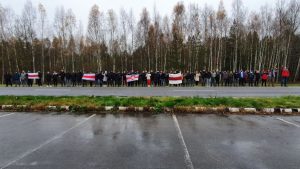 By November 4, the number of workers who joined the strike had reached 57. The ore mining plan has decreased. Public photographs of the equipment allowed bosses to respond to health and safety violations, and management began paying bonuses to workers. But the death of Raman Bandarenka on November 12 caused a new surge of indignation among the miners. In two days, ten workers were added to the strike. On top of that, on November 13, members of the strike committee were detained on an excursion to the homeland of Tadeusz Kosciuszko in Kossovo. 45 people were taken to the temporary detention facility in Baranovichi, almost 20 were sentences for imprisonment.[5] In the dungeons of the detention centre, in the presence of police officers, the detained members of the strike were forced to sign a dismissal order. Under pressure, some have done so. The miners reacted to the repression with new statements about joining the strike: 18 people did so on November 16 alone. On November 20, it became known that the management had dismissed almost 50 striking workers.
By November 4, the number of workers who joined the strike had reached 57. The ore mining plan has decreased. Public photographs of the equipment allowed bosses to respond to health and safety violations, and management began paying bonuses to workers. But the death of Raman Bandarenka on November 12 caused a new surge of indignation among the miners. In two days, ten workers were added to the strike. On top of that, on November 13, members of the strike committee were detained on an excursion to the homeland of Tadeusz Kosciuszko in Kossovo. 45 people were taken to the temporary detention facility in Baranovichi, almost 20 were sentences for imprisonment.[5] In the dungeons of the detention centre, in the presence of police officers, the detained members of the strike were forced to sign a dismissal order. Under pressure, some have done so. The miners reacted to the repression with new statements about joining the strike: 18 people did so on November 16 alone. On November 20, it became known that the management had dismissed almost 50 striking workers.
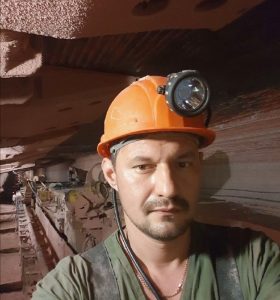 On November 24, Alexander Klezovich, a miner of the working face of mine 4 of the mine administrations, refused to rise from the mine. The reason was the murder of Raman Bandarenka. “We were deprived of a decent life, the right to choose. We have lost respect for each other. We learned a lot about each other after the August events. We begin to judge people not by their words, but by their actions”, said Alexander. Three hours after the announcement of joining the strike, a mine rescue team descended into the mine. Alexander, like his colleagues who made the same attempts, was taken out of the mine in an ambulance.[6]
On November 24, Alexander Klezovich, a miner of the working face of mine 4 of the mine administrations, refused to rise from the mine. The reason was the murder of Raman Bandarenka. “We were deprived of a decent life, the right to choose. We have lost respect for each other. We learned a lot about each other after the August events. We begin to judge people not by their words, but by their actions”, said Alexander. Three hours after the announcement of joining the strike, a mine rescue team descended into the mine. Alexander, like his colleagues who made the same attempts, was taken out of the mine in an ambulance.[6]
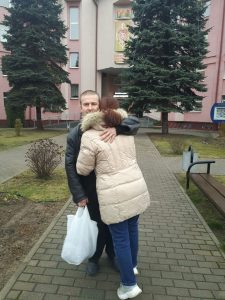 At the beginning of December, 101 employees of the enterprise were on strike. On December 24, a solo picket of the strike participant Andrei Stadub took place in Soligorsk. He went out to the central square to the Christmas tree with a poster “I stand brazenly, purposefully.” Thus, he reacted to the statement of the head of the KGB, Ivan Tertel, about the murder of Alexander Taraikovsky. The man was detained for this.[7] Andrei met the new year in the pre-trial detention center, which he left only on January 3.
At the beginning of December, 101 employees of the enterprise were on strike. On December 24, a solo picket of the strike participant Andrei Stadub took place in Soligorsk. He went out to the central square to the Christmas tree with a poster “I stand brazenly, purposefully.” Thus, he reacted to the statement of the head of the KGB, Ivan Tertel, about the murder of Alexander Taraikovsky. The man was detained for this.[7] Andrei met the new year in the pre-trial detention center, which he left only on January 3.
On January 19, “Belaruskali” declared the Day of Solidarity of the Workers of Free Belarus as a strike. On that day, the Supreme Court considered the cassation appeal against the decision of the Minsk Regional Court to declare the strike invalid. As the miners themselves put it, “The Supreme Court must give us the answer, who we are: free workers or silent slaves.” However, the decision remained unchanged.[8]
On January 31, miners announced the creation of their own fund to help the strikers. By that time, their number had increased to 130. And the illegal government only intensified the fight against courageous people. On February 14, 19 people were detained in the central park of the city of Soligorsk, who took part in a flash mob and ran 2334 meters through the forest. Four strike committee members: Konstantin Artemkov, Kirill Shvabovsky, Yevgeny Korolevich and Sergei Dmukhailo – were sentenced to administrative arrest on February 16.
On February 28, a new arrest of the strike committee members took place: three guys and four girls were detained in the forested area of Soligorsk. Three of them were released – they told that they were beaten in the police, including on the head. They treated the guys very cruelly. Among the detainees were the strike committee members Anton Demkov, Konstantin Dziteyev and Anton Mogilevets. After the beatings, Konstantin ended up in a hospital, his colleagues – in a temporary detention facility for 15 days. And on March 12, Anton Demkov and Anton Mogilevets were added another 15 days of arrest.
 On March 7, there was another attack on the strike committee members: a strike participant Aleksandr Novik was distributing flowers in the park for International Women’s Day. At that moment he was detained. On March 9, a trial took place over Alexander – he was sentenced to 15 days of administrative arrest.
On March 7, there was another attack on the strike committee members: a strike participant Aleksandr Novik was distributing flowers in the park for International Women’s Day. At that moment he was detained. On March 9, a trial took place over Alexander – he was sentenced to 15 days of administrative arrest.
The attacks on miners did not stop on March 25, Freedom Day, and after it, when opposition representatives announced protest marches. Strike participants Dmitry Karaka and Pavel Puchenya were detained and sentenced to 15 days. Searches took place at Dmitry Litvin and Alexander Molochko houses. Dmitry was kidnapped, taken to the police station and sentenced to 15 days of arrest.
Now there are 140 brave miners in the strike committee. Let’s specify that at the enterprise all this time after elections there are accidents about which the management keeps silent. At least three workers were killed, several more were seriously injured (one had a serious spinal injury). However, the management prefers not to think about replacing equipment and safety measures, but arranges reprisals against workers who disagree with the regime.
What about Yara?
Yara International is a Norwegian company, one of the world’s largest suppliers of mineral fertilizers and one of the key customers of “Belaruskali”. Immediately after the start of the protests in Belarus, it was Yara who began to be asked to break contracts with a Belarusian enterprise so as not to finance the violence. In September, the company posted a statement on its website in which it noted that it was in dialogue with “Belaruskali”: “We clearly expect our business partners to follow our ethical principles and that they comply with laws and regulations, as well as internationally recognized standards in the field of rights human rights, employee rights and ethical business conduct ”.[9]
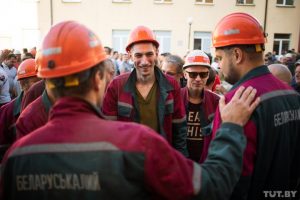 On September 18, Yara representatives visited Minsk and held talks with representatives of the Belarusian Potash Company and trade unions. At the meeting, the Norwegians discussed the safety and welfare of “Belaruskali” employees. “Our assessment continues to be that we can have the most positive impact by continuing a close dialogue with BPC and “Belaruskali”. We enjoy the support of this approach from our stakeholders and intend to continue this dialogue, provided that our concerns are resolved”, the company representatives said following the meeting.
On September 18, Yara representatives visited Minsk and held talks with representatives of the Belarusian Potash Company and trade unions. At the meeting, the Norwegians discussed the safety and welfare of “Belaruskali” employees. “Our assessment continues to be that we can have the most positive impact by continuing a close dialogue with BPC and “Belaruskali”. We enjoy the support of this approach from our stakeholders and intend to continue this dialogue, provided that our concerns are resolved”, the company representatives said following the meeting.
On September 25, the miners turned to Yara again. In a statement they talked about the detention of the strike committee co-chairman Anatoly Bokun, about the incident with Oleg Kudelka and asked to reconsider the agreements in connection with violations of workers’ rights.
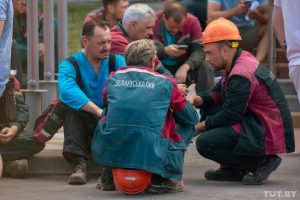 The importance of Yara’s position was also stressed by Sviatlana Tsikhanouskaya on November 4, during a conversation with representatives of the “Belaruskali” strike committee. On November 18, the strike committee reported that the company’s management had contacted the general director of the enterprise. Yara demanded an answer about the repression and layoffs of workers who supported the strike, because some of them were evicted from rental housing, all are under pressure. A company representative said that contracts and further cooperation with “Belaruskali” will be revised. However, the general director of “Belaruskali” Ivan Golovaty said that the facts of the repressions were fiction, and the strikers were not fired and could return to their jobs even tomorrow.
The importance of Yara’s position was also stressed by Sviatlana Tsikhanouskaya on November 4, during a conversation with representatives of the “Belaruskali” strike committee. On November 18, the strike committee reported that the company’s management had contacted the general director of the enterprise. Yara demanded an answer about the repression and layoffs of workers who supported the strike, because some of them were evicted from rental housing, all are under pressure. A company representative said that contracts and further cooperation with “Belaruskali” will be revised. However, the general director of “Belaruskali” Ivan Golovaty said that the facts of the repressions were fiction, and the strikers were not fired and could return to their jobs even tomorrow.
On December 5, a statement by Yara CEO Svein Tore Holsether appeared on the Internet, in which he noted that there was no improvement in the situation at the enterprise. “Of particular concern are the numerous reports of layoffs of workers who have peacefully expressed their democratic rights. The external communication of the company is also perceived by us as incomplete. The current situation is unacceptable for Yara”, he said.[10]
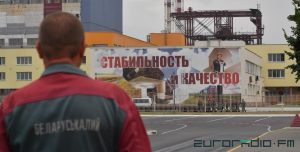 On December 10, representatives of the Norwegian company came to Belarus again. Negotiations with “Belaruskali” were held behind closed doors, members of the strike committee were not present. It is known that these were conditions that must be met in order to comply with Yara’s Code of Conduct for Business Partners. Yara’s management put forward several requirements, discussed the topic of occupational health and safety, and talked about industrial accidents.[11]
On December 10, representatives of the Norwegian company came to Belarus again. Negotiations with “Belaruskali” were held behind closed doors, members of the strike committee were not present. It is known that these were conditions that must be met in order to comply with Yara’s Code of Conduct for Business Partners. Yara’s management put forward several requirements, discussed the topic of occupational health and safety, and talked about industrial accidents.[11]
“Belaruskali” did not plan to fulfill any requirements of the foreign partner. The strike committee members wrote about this to the general director of Yara on January 10. They clarified that there have been no changes in the field of labor protection, pressure and reprisals against workers continue. Yara’s management has once again called for an end to cooperation with “Belaruskali” and an end to funding for the Lukashenko regime. On January 21, it became known that “Belaruskali” is ready to continue cooperation with Yara and accept its specialists to monitor production processes.
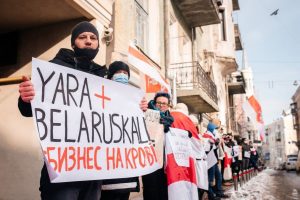 In winter, actions in support of the “Belaruskali” strike committee members and with appeals to Yara began all over the world. The Belarusians of Kiev, Lvov, Vilnius, St. Petersburg, Nuremberg, Warsaw and other cities turned to the Norwegian company with requests to stop cooperating with “Belaruskali”. And in February, a petition appeared on the Internet calling on the Norwegian potash company to react to what is happening in Belarus. The creators of the petition stressed that “Belaruskali” finances not only riot police and the KGB, but also detachments that torture civilians. And funds from mutual projects Yara and “Belaruskali” will be used for the construction and maintenance of concentration camps. The petition has now been signed by over 84,000 people around the world.
In winter, actions in support of the “Belaruskali” strike committee members and with appeals to Yara began all over the world. The Belarusians of Kiev, Lvov, Vilnius, St. Petersburg, Nuremberg, Warsaw and other cities turned to the Norwegian company with requests to stop cooperating with “Belaruskali”. And in February, a petition appeared on the Internet calling on the Norwegian potash company to react to what is happening in Belarus. The creators of the petition stressed that “Belaruskali” finances not only riot police and the KGB, but also detachments that torture civilians. And funds from mutual projects Yara and “Belaruskali” will be used for the construction and maintenance of concentration camps. The petition has now been signed by over 84,000 people around the world.
On February 23, the management of the Norwegian company received a joint position developed by Sviatlana Tsikhanouskaya, the Coordination Council and the People’s Anti-Crisis Management. In it, Yara is asked to impose sanctions against “Belaruskali” up to the unilateral termination of the agreement.
On March 5, Sviatlana Tsikhanouskaya made a call with Yara CEO Svein Tore Holsether. He was told about the facts of repressions against the strike committee “Belaruskali”, as well as about safety issues at the enterprise. Sviatlana Tsikhanouskaya called on the company to help stop the repressions against the strike participants.[12]
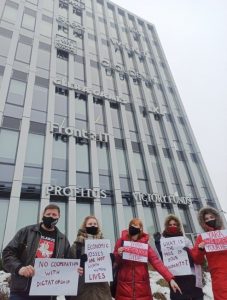 On March 9, Yara representatives decided to visit Soligorsk again. The delegation studied the labor protection system at the enterprise and visited workplaces. At the same time, there were no representatives of the strike committee, and the leadership showed only the cleanest, most comfortable and safe parts of production.[13] “In reality, the safety regulations at the plant are not observed and the number of accidents is increasing, since all the funds earned by the plant from the sale of potash salts are spent on maintaining the dictatorial regime. At the same time, the repression of the striking workers continues”, the strike committee said in a statement issued following the inspection.
On March 9, Yara representatives decided to visit Soligorsk again. The delegation studied the labor protection system at the enterprise and visited workplaces. At the same time, there were no representatives of the strike committee, and the leadership showed only the cleanest, most comfortable and safe parts of production.[13] “In reality, the safety regulations at the plant are not observed and the number of accidents is increasing, since all the funds earned by the plant from the sale of potash salts are spent on maintaining the dictatorial regime. At the same time, the repression of the striking workers continues”, the strike committee said in a statement issued following the inspection.
After that, a flash mob began on the Internet, where the participants tear up improvised “contracts” between “Belaruskali” and Yara on camera. On March 24, the strike committee of the enterprise addressed a new letter to Holsether, where they told the stories of several colleagues (in particular, Yuri Korzun, Oleg Koudelka, Alexander Klezovich) and mentioned that the strike committee members had served more than 800 days in total. The miners said that the enterprise had not made any improvements in terms of labor protection and safety measures, clarified that no anti-epidemic measures are being taken, and also that there is nothing illegal in the workers’ demands, and called to terminate the contract with “Belaruskali”.
Let us clarify that the Soligorsk enterprise cooperates not only with Yara. Among its partners are companies from Lithuania (Biriu kroviniu terminalas), Brazil (Rocha Forte Fertilizantes), India (IPL), China, Russia. The geography of supplies includes Poland, France, Spain, Italy, Czech Republic, Austria, Finland, USA, Japan, New Zealand. We ask “Belaruskali”’s foreign partners to listen to the voices of ordinary workers and think that the money that will go into the company’s coffers will go towards the well-being of people who beat and torture peaceful Belarusians.
[1]https://finance.tut.by/news696878.html
[2]https://www.svoboda.org/a/30836375.html
[3]https://finance.tut.by/news701151.html
[4]https://naviny.online/new/20201015/1602744981-shahter-”Belaruskali”ya-aleksandr-kurban-prikoval-sebya-cepyu-v-shahte-i
[5]https://reform.by/179757-zaderzhany-chleny-stachkoma-”Belaruskali”ja
[6]https://www.the-village.me/village/city/news-city/285989-shaht-snizu
[7]https://ex-press.by/rubrics/obshhestvo/2020/12/25/gornyak-provedshij-naglo-i-celenapravlenno-odinochnyj-piket-zaderzhan
[8]https://naviny.online/new/20210114/1610610498-stachkom-”Belaruskali”ya-prizval-obyavit-19-yanvarya-dnem-solidarnosti
[9]https://news.tut.by/economics/700683.html
[10]https://www.yara.com/news-and-media/news/archive/2020/message-from-yara-ceo-svein-tore-holsether-on-situation-in-belarus/
[11]https://finance.tut.by/news711109.html





